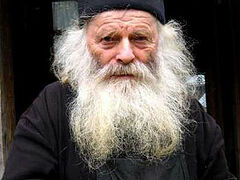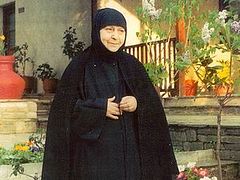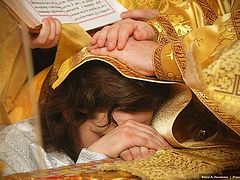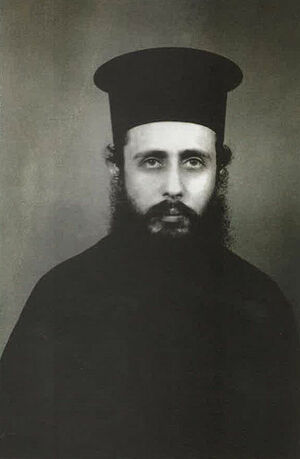 Fr. Epiphanios in his youth Time flies… It’s been several months since I turned twenty-five and began the twenty-sixth year of my life. Proposals for my ordination coming from many directions, which began already when I was twenty-two,1 are becoming more and more frequent. The time was approaching. That’s when a new offer came, and a completely unexpected one at that. Archbishop2 Dorotheos of Athens3 of blessed memory, who didn’t know me personally, urged me through our mutual friend Fr. Sperantzas, his dear friend and colleague, to accept ordination from him and join the administrative apparatus of the Archdiocese of Athens. I thank him, but firmly reject the offer and declare that the offer will be settled with me in another way. Sperantzas insists, but I firmly refuse. Soon after, my ordination takes place. At my fervent request, it took place at a simple daily service in the presence of a narrow circle of people. I was wearing a white sticharion, made of the simplest fabric (“pique”). I also asked that everything happen in silence. The bishop respected my desire and didn’t pronounce a word. (I mean he didn’t give any speech about the ordination). The amazing expression of St. Ignatius the God-Bearer: “Three mysteries crying to be known, but wrought in silence by God,”4 which correspond one-hundred percent to my character, penetrated very deeply into my soul and taught me that what is done “in silence by God” is the “mystery crying to be known,” and what is the “mystery crying to be known” is “wrought in silence by God.” This kind of “silence” captivated and delighted my heart. It was in those days, that is, a little after my ordination on November 9, 1956, that I got a letter from my dearly beloved and respected Fr. Gervasios (Paraskevopoulos)5 in which he congratulated me, expressed his good wishes, and asked about the future, that is, how I planned to work in the Church as a cleric. I told him that my goal and decision was to avoid official posts and high ranks, and work in a small, modest, and obscure place. And I continued: “I desire nothing other than to live and die as a simple priest (note: I was still a deacon), far from official posts and ranks, content to commune with my Lord, my books, my reflections, and a few chosen souls. Pray that I don’t deviate from this path.” I received an amazing letter in response, which I’m attaching in a copy:
Fr. Epiphanios in his youth Time flies… It’s been several months since I turned twenty-five and began the twenty-sixth year of my life. Proposals for my ordination coming from many directions, which began already when I was twenty-two,1 are becoming more and more frequent. The time was approaching. That’s when a new offer came, and a completely unexpected one at that. Archbishop2 Dorotheos of Athens3 of blessed memory, who didn’t know me personally, urged me through our mutual friend Fr. Sperantzas, his dear friend and colleague, to accept ordination from him and join the administrative apparatus of the Archdiocese of Athens. I thank him, but firmly reject the offer and declare that the offer will be settled with me in another way. Sperantzas insists, but I firmly refuse. Soon after, my ordination takes place. At my fervent request, it took place at a simple daily service in the presence of a narrow circle of people. I was wearing a white sticharion, made of the simplest fabric (“pique”). I also asked that everything happen in silence. The bishop respected my desire and didn’t pronounce a word. (I mean he didn’t give any speech about the ordination). The amazing expression of St. Ignatius the God-Bearer: “Three mysteries crying to be known, but wrought in silence by God,”4 which correspond one-hundred percent to my character, penetrated very deeply into my soul and taught me that what is done “in silence by God” is the “mystery crying to be known,” and what is the “mystery crying to be known” is “wrought in silence by God.” This kind of “silence” captivated and delighted my heart. It was in those days, that is, a little after my ordination on November 9, 1956, that I got a letter from my dearly beloved and respected Fr. Gervasios (Paraskevopoulos)5 in which he congratulated me, expressed his good wishes, and asked about the future, that is, how I planned to work in the Church as a cleric. I told him that my goal and decision was to avoid official posts and high ranks, and work in a small, modest, and obscure place. And I continued: “I desire nothing other than to live and die as a simple priest (note: I was still a deacon), far from official posts and ranks, content to commune with my Lord, my books, my reflections, and a few chosen souls. Pray that I don’t deviate from this path.” I received an amazing letter in response, which I’m attaching in a copy:
Patras 12/11/56
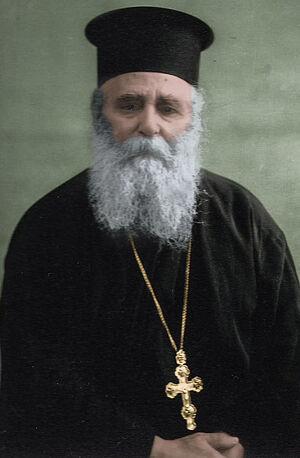 Fr. Gervasios Beloved Fr. Epiphanios and dear child in the Lord, since your love has called me “Elder.”
Fr. Gervasios Beloved Fr. Epiphanios and dear child in the Lord, since your love has called me “Elder.”
Rise up, be strengthened, and prosper by the might of the power6 of the One Who called you to the work of His Gospel, our Savior Christ.
Everything that you wrote to me in your kind letter delighted and gladdened my heart, especially: “I desire nothing other than … [being] content to commune with my Lord,” as well as the desire not to “deviate from this path.”
I was deeply moved and shed tears when I read this, because this was also my desire and fervent prayer when I fell in love with monastic attire and theology. But unfortunately, I was involuntarily lured in and wasted valuable time on empty administrative cares, foolishly believing in restitution and correction! O! How mistaken, stupid, and unfortunate I was! My Eteocles,7 and now, by the grace of my Lord, my Epiphanius! Be careful not to get lost and drawn in! Preserve the good pledge of the priesthood and the study of Patristic writings, which you are “called” to study with diligence. Don’t deviate from the grace that flows from them, that you might fulfill, or rather, fill up the law of grace with written works and research. With tender fatherly love,
Archim. Gervasios
I am researching, writing, editing a new edition of the famous Philokalia and other Church books for the publishing house of A. and E. Papadimitriou, and then other publishers, by which I provide myself with the means of living (from the very beginning, my needs were limited to the very least). I serve (that is, as a deacon) in the Church of the Three Holy Hierarchs (in Athens, at 4 Menandra Street), of course free of charge, or in the parakleses8 (of the Holy Apostles and St. Panteleimon) of the Church of St. John the Forerunner in Kalamata9 with Fr. Agathangelos (Mikhailidis)10 or, very rarely, in some (three-four) parish churches (when I go home for a visit). I hold talks on Sunday evenings in men’s groups at 4 Menandra Street in Athens and at two metochia of the Velanidia Monastery in Kalamata (outdoors, in front of the Church of St. Demetrios in the summer and in the Church of the Holy Archangels in the winter). Together with Fr. Joel of blessed memory11 we hold public debates with the “preacher” of the Kalamata “Evangelicals.” I study many volumes of Migne’s Patrologia Graeca from the Kalamata cathedral library, and so on. And so the time comes for my ordination to the priesthood. Until then, already from the age of twenty-six, I had always politely and with filial respect declined the offer of the bishop who ordained me to elevate me to the priesthood, declaring each time that I wish to strictly observe the prescriptions of the sacred canons. But now I’m thirty and I no longer have any excuse to refuse. And again I’m ordained on an ordinary day, with a narrow circle of invited guests. Since it was one of the Saturdays in Great Lent (March 1961), there were parishioners in the church who had nothing to do with me. In total, there were no more than seventy or eighty people there. My request was heard again: There were no congratulatory speeches or response speeches.
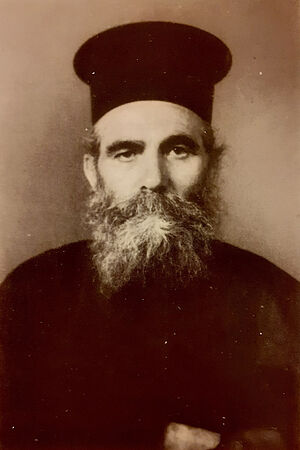 Fr. Joel The years fly by… The center of my spiritual activity (with the permission and blessing of all the successive Archbishops of Athens) was the small paraklesis of the community of the Three Holy Hierarchs. The founding of the community was approved and blessed by Archbishop Chrysostomos (Papadopoulos) of Athens of blessed memory.12 He also laid the foundation stone for the building. And when it was finished, he personally consecrated it. Another center of activity was the building of the Longovarda Monastery (where I live) at 24 Makedonios Street, with the little paraklesis of the Life-giving Spring, also erected (like all the buildings) by the care of a special society, which functioned not only with the blessing but also under the honorary chairmanship of the then-Archbishop Theoklitos II (Panagiotopoulos) of Athens,13 which is indicated on the corresponding marble plaque…
Fr. Joel The years fly by… The center of my spiritual activity (with the permission and blessing of all the successive Archbishops of Athens) was the small paraklesis of the community of the Three Holy Hierarchs. The founding of the community was approved and blessed by Archbishop Chrysostomos (Papadopoulos) of Athens of blessed memory.12 He also laid the foundation stone for the building. And when it was finished, he personally consecrated it. Another center of activity was the building of the Longovarda Monastery (where I live) at 24 Makedonios Street, with the little paraklesis of the Life-giving Spring, also erected (like all the buildings) by the care of a special society, which functioned not only with the blessing but also under the honorary chairmanship of the then-Archbishop Theoklitos II (Panagiotopoulos) of Athens,13 which is indicated on the corresponding marble plaque…
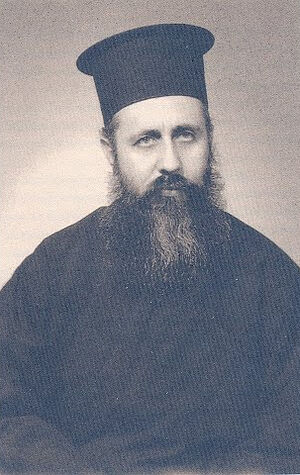 Archimandrite Epiphanios This year (1986) marks, with God’s help, twenty-five years of my priestly ministry. Shall I set forth what has been accomplished by the grace and bounties of the Lord, Who loves mankind, during this period? But this is completely alien to my principles and my character. After all, everything that has been done belongs to Him; my only “achievement” is my sins. But since I am “condemned” (I write this word in quotes because I know that this condemnation is spoken out of love and includes praise for my poverty) by honorable fathers and brothers for having “caused damage” (!!!) to the Church, having not accepted the episcopate, I cannot bear the temptation to not say the following. My conscience testifies that I, at the least, didn’t take the denarius (denarius: not a talent!) given to me and hide it in the earth. From the depths of my heart I bless Holy God that His grace which was bestowed upon me was not in vain.14 The fruit of my inconspicuous and quiet activity was two hundred (at least) poor young people who were studying various disciplines (I mean covering the costs of their education), and about a hundred young men dressed in a cassock, some of whom entered monasticism and some of whom became priests—married or celibate clergy. Should I mention the aid to those in need of funds and medicines (you live near me and you know that through a special “legal entity,” to avoid complaints about handling business—a responsibility that from the very beginning was entrusted not to me, but to others—tens of millions have been allocated for charitable purposes; the funds remaining from the publication of my books, which are widely distributed, are also sent there); about forming groups to donate blood for patients undergoing surgery; about reconciling spouses; about the prevention of divorces; about the prevention of planned abortions; about children coming into the world (many of them are in college today!...) who had been condemned to never be born because their parents refused further to raise any more children; about the conversion of schismatics and heretics; about Baptisms, after catechesis, of a considerable number of heterodox (always by decree of the bishop); about the regularization of relations of unlawfully cohabiting couples;15 about the rebirth of souls, and so and so on? But for priests who have some zeal, all this is the “routine” of their lives. Of course, it pains me to name all these deeds, which were wrought far from all publicity and noise, in extreme silence, “in the silence of God,” but my pain subsides from the thought that this text, although it is a necessary “apology,” is not intended for the public. Finally, I could ask: Despite my suffering from illness and generally fragile health, despite being constantly busy with spiritual activities, what battle of my Church was I not prepared for? If I did not “adorn” cathedras; if I did not “add brilliance” to services (being completely unfit for it, having neither ear nor voice...); if I did not enter churches with pomp, dragging a mantia with a long “tail” behind me, with preceding priests and deacons and melodiously ringing bells; if I didn’t hear “Many Years” from melodious choirs; if I didn’t bless the people with the dikiri and trikiri; if I didn’t parade through the streets in gold-adorned vestments amidst rows of soldiers to the sound of a brass band; if..., if..., if... But I was neither a coward nor a deserter. Even though I was a “freelance shooter,” I was always on the battlefield. Which enemies of the Church did I not fight through letters, articles, books, and endless discussions privately and publicly? What vital topics for the Church did I ignore in silence or indifference? What Church interests did I not defend with all my might from my insignificant and modest place? But I will set a watch before my mouth,16 because I unwittingly got dragged in and I am become a fool in glorying17... God, be merciful to me, a sinner!
Archimandrite Epiphanios This year (1986) marks, with God’s help, twenty-five years of my priestly ministry. Shall I set forth what has been accomplished by the grace and bounties of the Lord, Who loves mankind, during this period? But this is completely alien to my principles and my character. After all, everything that has been done belongs to Him; my only “achievement” is my sins. But since I am “condemned” (I write this word in quotes because I know that this condemnation is spoken out of love and includes praise for my poverty) by honorable fathers and brothers for having “caused damage” (!!!) to the Church, having not accepted the episcopate, I cannot bear the temptation to not say the following. My conscience testifies that I, at the least, didn’t take the denarius (denarius: not a talent!) given to me and hide it in the earth. From the depths of my heart I bless Holy God that His grace which was bestowed upon me was not in vain.14 The fruit of my inconspicuous and quiet activity was two hundred (at least) poor young people who were studying various disciplines (I mean covering the costs of their education), and about a hundred young men dressed in a cassock, some of whom entered monasticism and some of whom became priests—married or celibate clergy. Should I mention the aid to those in need of funds and medicines (you live near me and you know that through a special “legal entity,” to avoid complaints about handling business—a responsibility that from the very beginning was entrusted not to me, but to others—tens of millions have been allocated for charitable purposes; the funds remaining from the publication of my books, which are widely distributed, are also sent there); about forming groups to donate blood for patients undergoing surgery; about reconciling spouses; about the prevention of divorces; about the prevention of planned abortions; about children coming into the world (many of them are in college today!...) who had been condemned to never be born because their parents refused further to raise any more children; about the conversion of schismatics and heretics; about Baptisms, after catechesis, of a considerable number of heterodox (always by decree of the bishop); about the regularization of relations of unlawfully cohabiting couples;15 about the rebirth of souls, and so and so on? But for priests who have some zeal, all this is the “routine” of their lives. Of course, it pains me to name all these deeds, which were wrought far from all publicity and noise, in extreme silence, “in the silence of God,” but my pain subsides from the thought that this text, although it is a necessary “apology,” is not intended for the public. Finally, I could ask: Despite my suffering from illness and generally fragile health, despite being constantly busy with spiritual activities, what battle of my Church was I not prepared for? If I did not “adorn” cathedras; if I did not “add brilliance” to services (being completely unfit for it, having neither ear nor voice...); if I did not enter churches with pomp, dragging a mantia with a long “tail” behind me, with preceding priests and deacons and melodiously ringing bells; if I didn’t hear “Many Years” from melodious choirs; if I didn’t bless the people with the dikiri and trikiri; if I didn’t parade through the streets in gold-adorned vestments amidst rows of soldiers to the sound of a brass band; if..., if..., if... But I was neither a coward nor a deserter. Even though I was a “freelance shooter,” I was always on the battlefield. Which enemies of the Church did I not fight through letters, articles, books, and endless discussions privately and publicly? What vital topics for the Church did I ignore in silence or indifference? What Church interests did I not defend with all my might from my insignificant and modest place? But I will set a watch before my mouth,16 because I unwittingly got dragged in and I am become a fool in glorying17... God, be merciful to me, a sinner!
To be continued…

